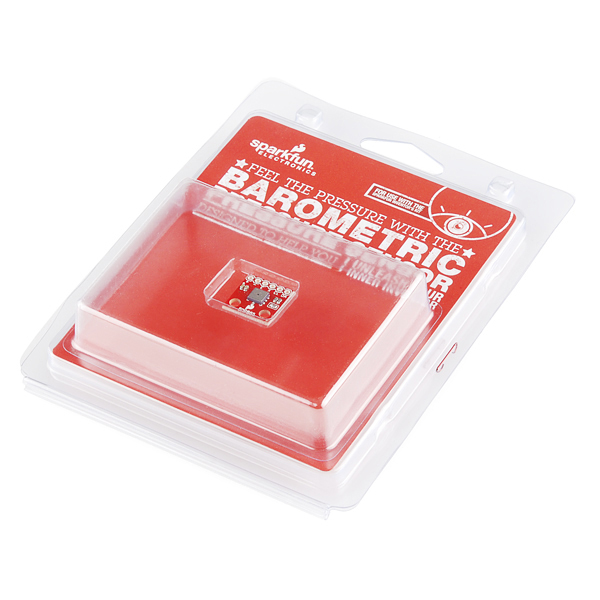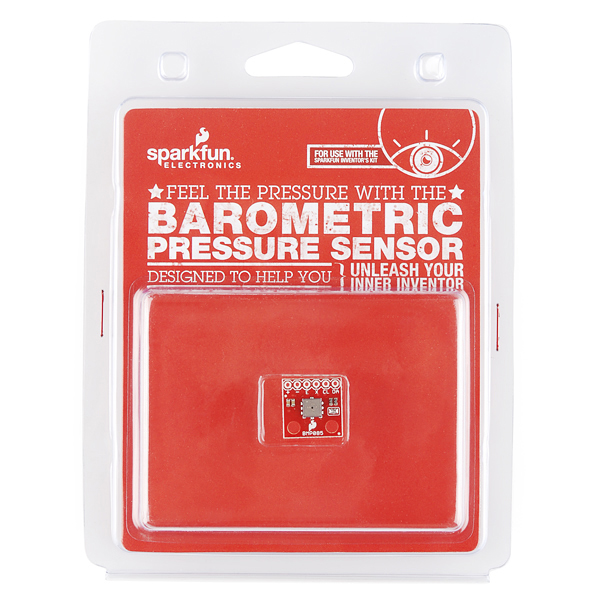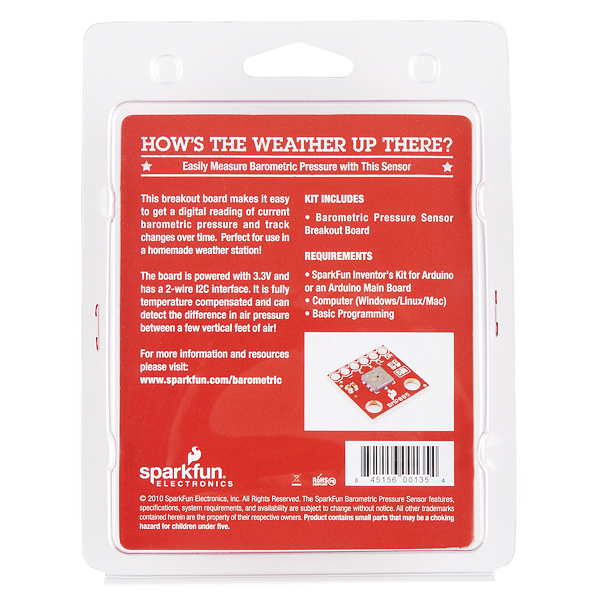Barometric Pressure Sensor - BMP085 Breakout Retail
Replacement: None. We are no longer carrying this barometric pressure sensor retail kit in our catalog. This page is for reference only.
This is a simple breakout board for the BMP085 high-precision, low-power digital barometer in retail packaging. The BMP085 offers a measuring range of 300 to 1100 hPa with an accuracy down to 0.03 hPa in ultra-high resolution mode (that's 0.25m of altitude at sea level!) It's based on piezo-resistive technology for high accuracy, ruggedness and long term stability. These come factory-calibrated, with the calibration coefficients already stored in ROM. Writing your own code for it requires some math, but there are plenty of examples and libraries available (see below).
This breadboard-friendly board breaks out every pin to a 6-pin 0.1" pitch header. VCC can be from 1.8V to 3.6V; we typically run it on a clean, regulated 3.3V supply. The analog and digital supplies (VDDD and VDDA) are tied to a single header pin, but are separately decoupled. It connects to a microcontroller via I²C bus (also known as TWI, or on the Arduino, the "Wire" library).
We've made some minor hardware changes this time around to address some suggestions from the comment section including the addition of a solder jumper to disable the I2C pull-ups.
Replaces:RTL-09889
- Digital two wire (I²C, TWI, "Wire") interface
- Wide barometric pressure range
- Flexible supply voltage range (1.8V to 3.6V)
- Ultra-low power consumption
- Low noise measurements
- Factory-calibrated
- Includes temperature sensor
- Low-profile with a small footprint* 0.6" x 0.6" (15.24 x 15.24 mm)
Barometric Pressure Sensor - BMP085 Breakout Retail Product Help and Resources
Core Skill: Soldering
This skill defines how difficult the soldering is on a particular product. It might be a couple simple solder joints, or require special reflow tools.
Skill Level: Noob - Some basic soldering is required, but it is limited to a just a few pins, basic through-hole soldering, and couple (if any) polarized components. A basic soldering iron is all you should need.
See all skill levels
Core Skill: Programming
If a board needs code or communicates somehow, you're going to need to know how to program or interface with it. The programming skill is all about communication and code.
Skill Level: Competent - The toolchain for programming is a bit more complex and will examples may not be explicitly provided for you. You will be required to have a fundamental knowledge of programming and be required to provide your own code. You may need to modify existing libraries or code to work with your specific hardware. Sensor and hardware interfaces will be SPI or I2C.
See all skill levels
Core Skill: Electrical Prototyping
If it requires power, you need to know how much, what all the pins do, and how to hook it up. You may need to reference datasheets, schematics, and know the ins and outs of electronics.
Skill Level: Rookie - You may be required to know a bit more about the component, such as orientation, or how to hook it up, in addition to power requirements. You will need to understand polarized components.
See all skill levels
Comments
Looking for answers to technical questions?
We welcome your comments and suggestions below. However, if you are looking for solutions to technical questions please see our Technical Assistance page.
Customer Reviews
No reviews yet.




Two questions,
Assuming I have everything properly connected to this device, would I be able to detect a difference in reading if I raised it 3ft? for example. I'm not looking for absolute accuracy, I'm looking to use this to measure rate of change in altitude.
Will you guys start supplying the BMP 180 soon?
The last time I had one on my desktop, the noise was on the order of 3 feet and you could definitely see the difference when it was moved from floor to desk to ceiling, so with some averaging it could likely do what you want (but not a whole lot more). (Interestingly it also clearly showed when the HVAC switched on and off, "pressurizing" the building envelope. These things are sensitive.)
And yes, since the BMP085 is being retired, we'll have a BMP180 product out this fall. They're software-compatible so in most cases you shouldn't have any problems switching from one to the other.
There is code on OBEX for using this sensor with the Propeller Processor.
How do you guys always end up adding products a few hours after the new product post? :)
It happens when we run out of the old revision and transition to the new one. It happens as people make purchases and is not something we can 'plan' out.